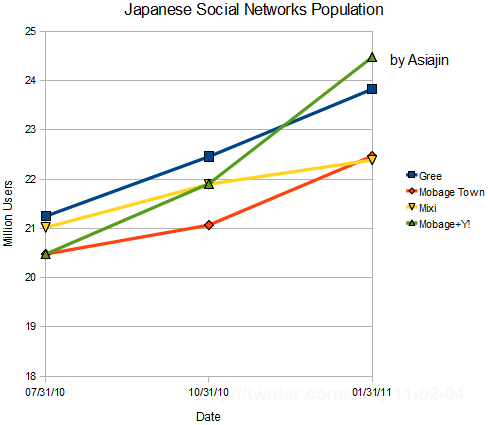At the beginning of February, two of Japanese social networking giants, Gree and DeNA(Mobage Town company) released quarterly financial reports.
Gree’s 2011-2Q report [J] showed its sales record, 14.32 billion yen(US$175 mil), 83% of which is from virtual items. It is the historic high.
DeNA 2011-3Q [J] also recorded their highest 29.49 billion yen(US$361 mil) sales, 153% increased.
Who is the most popular social network service in Japan?
The major three services have been racing on their number of registered users, and now it is difficult to tell which is the biggest. All three can tell they are the No.1.

Gree: On the report, 23.83 million users is the largest number among all. They keep the top position since they snatched it from long-time champion Mixi in July 2010. From this, you may tell that Gree is No.1.
Mobage Town: DeNA sums up their original, mobile-only network Mobage Town and Yahoo! Mobage, recently launched PC-based new network with Yahoo! Japan. Yahoo! Mobage got 2 million users within half an year and if you count them into Mobage users, the total 24.48 million is 650,000 more than Gree’s number.
Gree’s membership includes their unpopular PC version users (only 1% of traffic comes from PC), but Gree user can access both version by single account. DeNA seems not exclude people who registered both Mobage Town and Yahoo! Mobage.
Mixi: The latest number has not been announced by Mixi so the today’s plot on the graph is an expected number. It was 21.9 milliion in October, seems increasing steadily.
[Update 2011-02-04] Mixi’s 3Q report [J] has come. Their official number of users is 22.39 million, at the end of December. It should be very close to the number of Mobage Town’s mobile users now. Mixi possibly ranked down, or will be down soon at the third place even without Yahoo! Mobage.
If you count on PC, Mixi is still the largest social network service in Japan. The services which can not track Japanese feature phone traffic, like Alexa, ComScore and Google Trends for Websites, are showing Mixi is leading a lot. (That is why I said that The World Map of Social Networks should set Mixi as the top as it is PC based research.)
See Also:
Facebook is sidelined in Japan as social network battle heats up | The Japan Times Online
Social gaming frenzy sees two Godzillas play rough | The Japan Times Online
Further, the usability of social networks rely on the numbers. If there are too few people with a profile on a social network, what is the point of using the site?
Verification is time consuming, but more importantly, such measures prevent the inflation of the purported number of users with a profile on the site (and numbers are all that the investors really care about). What benefits would social networks get from guaranteed identity as opposed to the drop off of joiners because of the additional hurdles because of the burden of proof? How would you propose to identify someone since most major networks simply push the burden of identity proof further along the chain and the likely resentment of government intervention in social networks / identity?
As you work through these issues it rapidly becomes apparent that whilst guaranteed identity is a claimed altruistic aim of many sites across the web, delivery will always be secondary to primary business / social aims.
http://osakabentures.com/2011/02/should-social-networks-verify-identities/
You are right. All those three now strictly check registration by using cellphone ID, which means you cannot make the second account unless you purchase another cellphone, so their numbers should be more accurate than Twitter and Facebook, on which you can freely make multiple accounts.
Although I do not like the idea, It is more practical than that Facebook Japan tried to demand copy of your ID papers and failed.
http://asiajin.com/blog/2011/02/21/im-an-russian-japanese-facebook-beset-on-japanese-nickname-judgement/